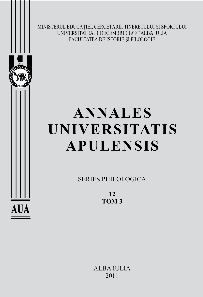Opţiunea ideologică a lui Adrian Marino: un model alternativ de realizare a dialogului cultural
Adrian Marino s Ideological Option:an Alternative Model for Achieving the Cultural Dialogue
Author(s): Cristina-Elena Ciuntuc (Andriuţă)Subject(s): Literary Texts
Published by: Universitatea »1 Decembrie 1918« Alba Iulia
Keywords: ideology; cultural identity; European idea; “the third discourse”; neo-1848-ism; synchronization; cultural dialogue
Summary/Abstract: The beginning of the 1990s, by changing the registered political trajectory, provides Adrian Marino, the critic of literary ideas, with an increasing possibility to assert a strong ideological position. The concept of ideology has always been connoted by the writer in a positive manner, being assigned a key role in the process of building a civilized society and representing an essential instrument in the process of political, social and, ultimately, literary knowledge. The author becomes the promoter of an active and vibrant cultural movement, aiming to facilitate the assimilation process of as many European ideas as possible by the local collective mentality. In this sense, the writer adopts, in ideological terms, an equidistant position called by Sorin Antohi “the third discourse”, a felicitous metaphor that perfectly describes the essential details of the cultural-political thinking of Adrian Marino. The critic is not likely to grant any undue credit to purely mimetic Europeanist theories or to completely circumvent the local cultural realities, without, however, falling into the trap of nationalist isolationism. Thus, Adrian Marino aims at making a synthesis between the reactionary and the revolutionary forces in Romanian culture manifested over time, striving to assume a double condition (Romanian/European) and to establish a productive dialogue that would enable the integration of the opportunities offered by Western otherness into the Romanian socio-cultural identity. From an ideological point of view, the author is part of an “enlightened-liberal-1848-ist” tradition within the lineage of such artists as Stefan Zeletin, Eugen Lovinescu, Mihai Ralea or Paul Zarifopol, arguing that most of the ambitious reforms, regarding state modernization, proposed by the leaders of the Romanian revolution of 1848, still await their completion. The critic calls for an organic, integrating perspective on Romanian culture, one in which the aesthetic values can be found alongside the social, political, economic values, proposing a synthetic, “culturally civilizing” vision. For Marino, the process of modernization, i.e. of Europeanization is not, as in the case of Constantin Noica, only an adaptation on the abstract, intellectual level, but covers the whole range of measures and events called by such an adjustment, emphasizing, along with the idea of cultural perfection, the urgent need to achieve concrete goals, such as increasing institutional efficiency and economic power or the interest in ensuring geopolitical stability in South-Eastern Europe.
Journal: Annales Universitatis Apulensis. Series Philologica
- Issue Year: 12/2011
- Issue No: 3
- Page Range: 33-42
- Page Count: 9
- Language: Romanian

